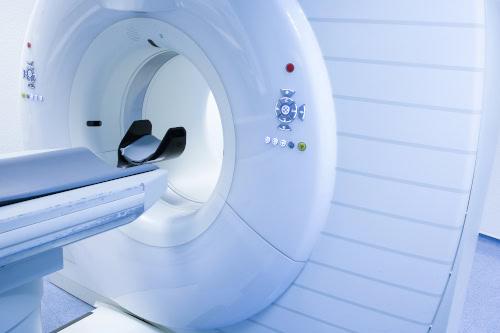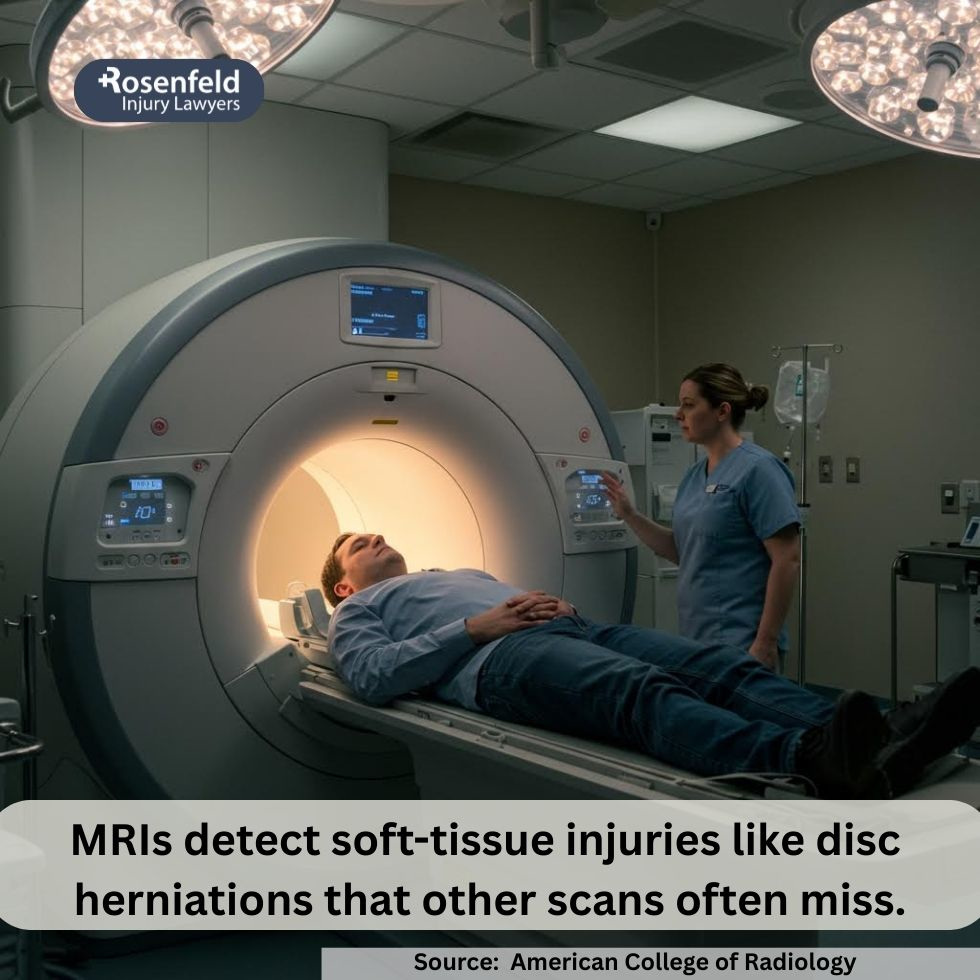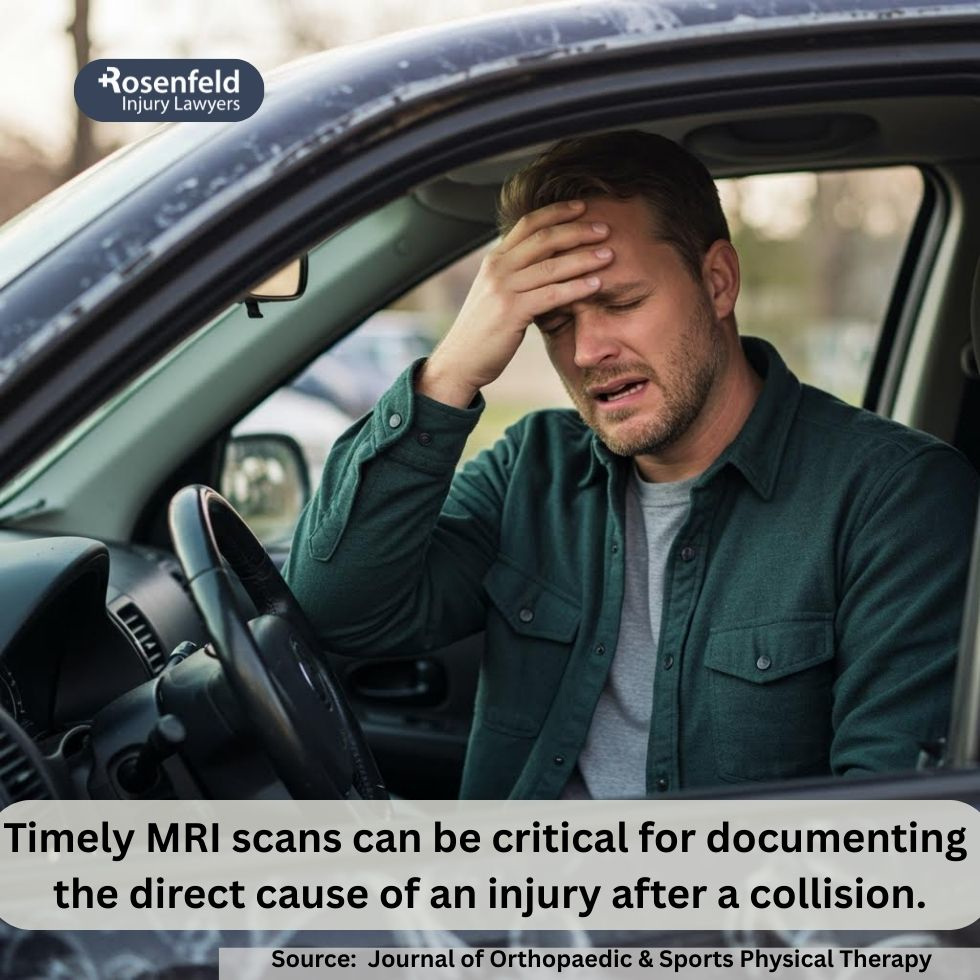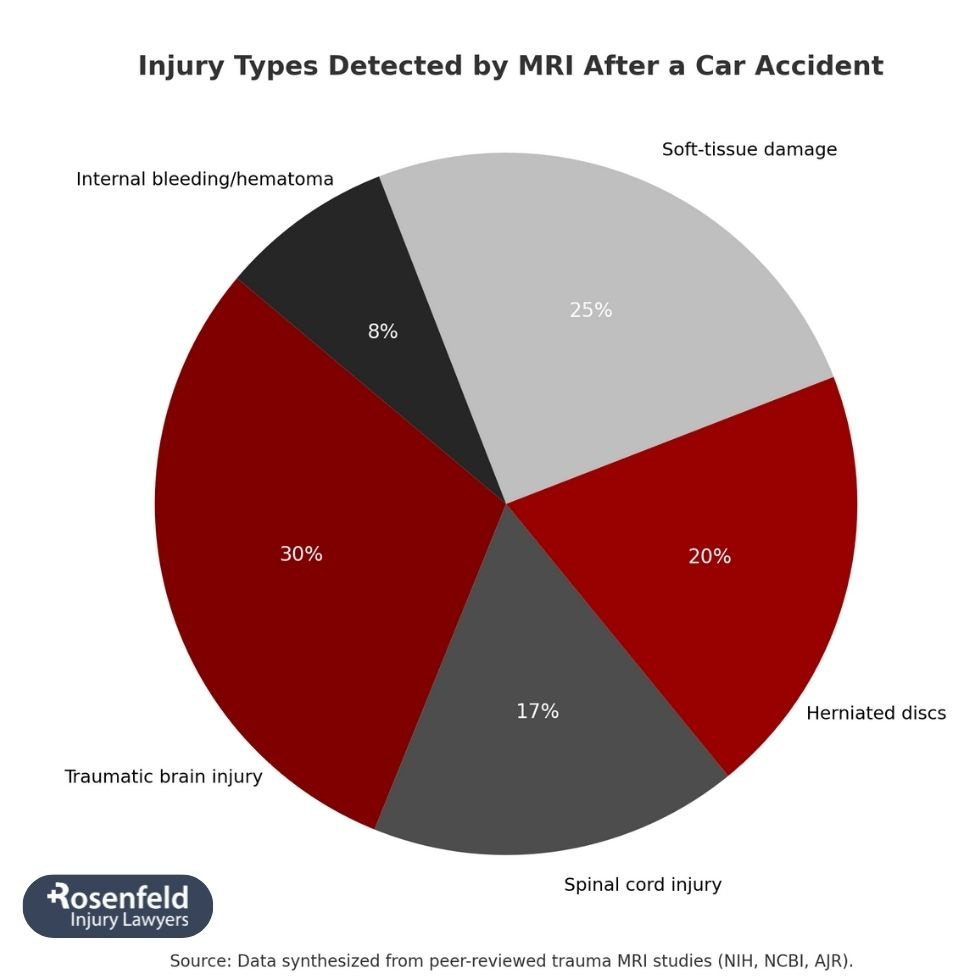- 24/7 Free Consultation: (888) 424-5757 Tap Here To Call Us
MRI After a Car Accident

Should I Get an MRI or CT Scan After a Chicago Car Accident?
After a car accident, you might walk away feeling lucky—no broken bones, no visible wounds. But that doesn’t always mean you’re in the clear. Many car accident injuries, in fact, some of the most serious injuries, can stay hidden without the proper medical evaluation.
That’s where diagnostic tools like MRI scans and CT scans come in. These advanced imaging tests help medical professionals detect subtle injuries that might not appear during a routine exam or X-ray.

Understanding MRI and CT Scans: What’s the Difference?
MRI and CT scans are two of the most common imaging tools used after a car accident, but they serve different purposes based on the type of injury.
An MRI (magnetic resonance imaging) uses powerful magnets and radio waves to create detailed images of the body’s soft tissues. It’s beneficial for identifying injuries to muscles, ligaments, tendons, the brain, and the spinal cord. If you’re dealing with soft tissue injuries, a suspected herniated disc, or signs of brain trauma, an MRI scan is often the preferred choice.
A CT scan (computed tomography), on the other hand, uses a series of X-rays to produce cross-sectional images of the body. It’s particularly effective for detecting broken bones, internal bleeding, or damage to internal organs. CT scans are typically faster than MRIs and are often used in emergencies when doctors need quick answers about serious injuries.
Common Car Accident Injuries Diagnosed with MRI
MRI scans are beneficial for detecting hidden injuries after a car accident. They’re often used to diagnose traumatic brain injuries, including concussions or bleeding that may not show up on a CT scan.
MRIs also reveal spinal cord injuries, such as herniated discs or nerve compression, which can cause severe pain and limited movement. They’re commonly used for whiplash and neck injuries to detect damage to discs or soft tissues.
Soft tissue injuries—like torn ligaments, sprains, and muscle strains—are easier to spot with an MRI than other diagnostic tests.

Common Injuries Diagnosed with CT Scan
CT scans are often the first imaging test after a car accident, especially in emergencies. They’re fast and effective at revealing serious injuries that require immediate medical treatment.
CT scans provide clear, detailed images of bone injuries, including small or complex fractures that might be missed on a regular X-ray.
A CT scan can quickly detect bleeding around internal organs, helping doctors identify life-threatening injuries and begin treatment right away.
When is an MRI Necessary After an Auto Accident?
While not every car accident injury requires an MRI, there are specific situations where doctors may recommend one to detect hidden injuries or confirm a diagnosis.
If standard imaging doesn’t reveal the cause of ongoing pain, especially in the back, neck, or joints, an MRI may be needed to check for soft tissue damage or spinal injuries.
Numbness, tingling, weakness, or coordination problems could signal nerve compression, spinal cord injuries, or brain trauma. MRI scans provide detailed images that can pinpoint the source of these symptoms.
If there’s concern about traumatic brain injuries or spinal cord compression, an MRI is often used to evaluate the brain and spinal structures more closely.
If pain or other symptoms intensify days or weeks after the accident, an MRI can help detect subtle injuries that may have gone unnoticed early on.
When is a CT Scan Necessary After a Car Accident?
A CT scan is typically the go-to option when doctors need fast, detailed images to assess serious injuries.
It’s essential when there’s an immediate need for results, such as in cases involving loss of consciousness, visible trauma, or severe pain. CT scans are highly effective in identifying suspected fractures, particularly in the spine, skull, or ribs.
They are also used to detect internal bleeding or damage to internal organs—injuries that can quickly become life-threatening without prompt medical treatment.

Why Might an MRI Be Delayed or Denied After a Car Accident?
Even if you’re in severe pain after a car accident, an MRI may not be done right away. Emergency room teams usually prioritize identifying and treating life-threatening injuries first, using quicker tools like X-rays or CT scans.
Insurance companies also play a role. Because MRIs are expensive, they may push back or require proof that other diagnostic tests were inconclusive before approving one. Sometimes, your doctor may not initially order an MRI if symptoms seem mild or are expected to improve with time.
If your pain persists or worsens, following up with your primary care physician or specialist is essential.
The Importance of a Complete Diagnosis for Your Injury Claim
A complete medical diagnosis after a car accident does more than guide your recovery—it also plays a significant role in your personal injury claim.
MRI and CT scan results help medical professionals identify the full scope of your injuries, especially hidden injuries that aren’t obvious during an initial exam. This ensures you receive the proper medical treatment and lowers the risk of complications.
Clear diagnostic evidence also supports your claim for fair compensation. It allows your legal team to accurately calculate your medical expenses, lost wages, and any future care you need. Without this documentation, insurance companies may question the extent of your injuries, making it harder to pursue fair compensation for the harm you’ve suffered.
Hidden Injuries: Why Early Detection Matters to Car Accident Victims
Some of the most serious car accident injuries aren’t obvious right away. Soft tissue injuries, spinal cord damage, or brain trauma can take hours—or even days—to show apparent symptoms. When severe pain or other warning signs appear, the injury may have worsened, leading to a longer recovery and more intensive treatment.
How a CT Scan and an MRI After a Car Accident Can Solidify Your Claim
MRI and CT scan results are powerful, objective evidence in a car accident claim. Unlike general pain complaints or soft tissue injuries that may be hard to prove, these scans provide clear, detailed images that show what damage occurred, whether it’s a herniated disc, brain trauma, or internal organ damage.
This makes it harder for insurance companies to downplay or deny the seriousness of your injuries. With documented proof from trusted medical providers, your injury claim strengthens, helping you pursue fair compensation for medical treatment, lost wages, and long-term care needs.
What to Expect During an MRI or CT Scan
MRI and CT scans are painless, but the experience differs slightly between the two.
During an MRI, you’ll lie flat on a table that slides into a tube-like machine. The scan uses magnetic fields and radio waves, which can be noisy, so earplugs or headphones are often provided. Some people find the enclosed space claustrophobic, but the procedure is safe and typically lasts 30 to 60 minutes.
A CT scan is quicker and less enclosed. You’ll lie on a table that moves through a large, donut-shaped scanner. It usually takes only a few minutes and is often used in emergencies for fast results.
Potential Risks and Side Effects of MRI and CT Scans
MRI and CT scans are generally safe, but there are a few things to remember.
MRI scans aren’t suitable for people with certain metal implants, like pacemakers or surgical clips, as the magnetic field can interfere with them. Some patients also experience claustrophobia due to the enclosed space and noise.
CT scans involve exposure to a small amount of radiation, which is usually considered low risk but may be a concern with repeated scans. In rare cases, patients may have an allergic reaction to the contrast dye used to improve image clarity.
Alternatives to MRI and CT Scans
While MRI and CT scans are highly effective for diagnosing many car accident injuries, there are other imaging options depending on the type and location of the injury.
X-rays are often the first test used after a crash. They’re quick and helpful in detecting bone fractures or dislocations, but aren’t as effective at revealing soft tissue injuries or brain trauma.
Ultrasound uses sound waves to create real-time images and is commonly used to assess internal organs or detect fluid buildup. It’s noninvasive and doesn’t involve radiation, but it’s more limited in detail compared to an MRI or CT scan.
Preparing For a CT Scan or MRI After a Car Accident
If you’ve been scheduled for an MRI or CT scan after a car accident, a few simple steps can help the process go smoothly.
- Avoid food or drinks beforehand;
- Wear loose, comfortable clothing;
- Remove all metal objects.
How a Chicago Car Accident Lawyer Can Help You Get the Diagnostics You Need
After a car accident, a lawyer can play a key role in helping you get the diagnostic tests you need, like an MRI or CT scan. They can connect you with medical professionals for proper evaluation and push back if insurance companies resist covering the cost of necessary tests.
Your attorney will include the cost of these diagnostics in your personal injury claim to ensure you’re not paying out of pocket. After a settlement, they can also help negotiate medical bills so you keep more of your compensation for recovery and future care.

FAQs About MRI and CT Scans After Car Accidents in Chicago
Should I Always Ask for an MRI Right Away?
Not always. Talk to your doctor if you’re experiencing pain, numbness, or neurological symptoms. They’ll determine whether an MRI is appropriate based on your symptoms and exam results.
Can I Refuse an MRI or CT Scan?
Yes, but refusing a scan may delay diagnosis and treatment. It can also hurt your personal injury claim if your injuries aren’t fully documented. Talk with your medical provider before making that decision.
How Much Are Most Car Accident Settlements?
Settlement amounts vary based on the severity of injuries, medical costs, and lost wages. Some cases resolve for a few thousand dollars; others involving serious injuries can reach six figures or more.
How Long Does it Take to Get Results From an MRI or CT Scan
In many cases, preliminary results from a CT scan are available within a few hours, especially in emergencies. MRI results may take a bit longer—often 24 to 48 hours—since they require a more detailed review by a radiologist before being sent to your doctor.
Secure Expert Legal Counsel

If you’ve been injured in a car accident and need help getting the diagnostic tests or medical care you deserve, Rosenfeld Injury Lawyers is here for you. We work with medical professionals, handle insurance issues, and fight to recover full compensation for your injuries.
Our Chicago car accident attorney team works on a contingency fee basis, meaning you pay nothing unless we win your case. Call us at (888) 424–5757 or complete our contact form to schedule your free consultation.
All content undergoes thorough legal review by experienced attorneys, including Jonathan Rosenfeld. With 25 years of experience in personal injury law and over 100 years of combined legal expertise within our team, we ensure that every article is legally accurate, compliant, and reflects current legal standards.







